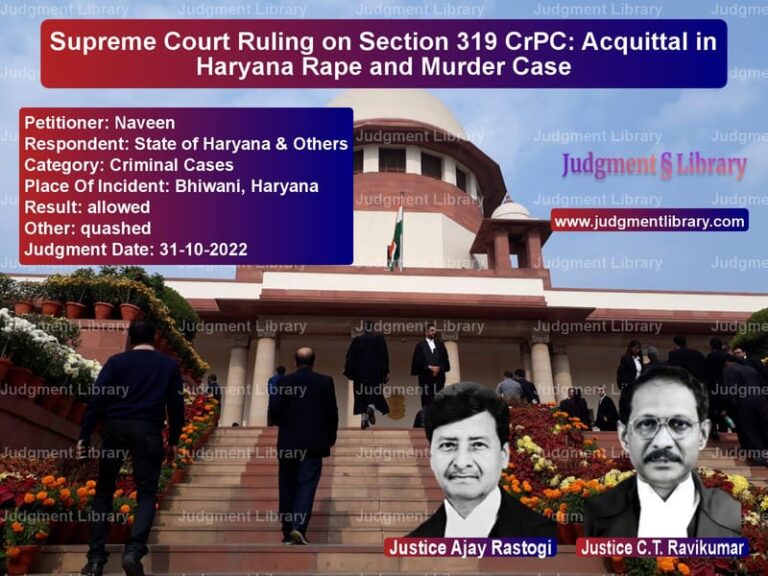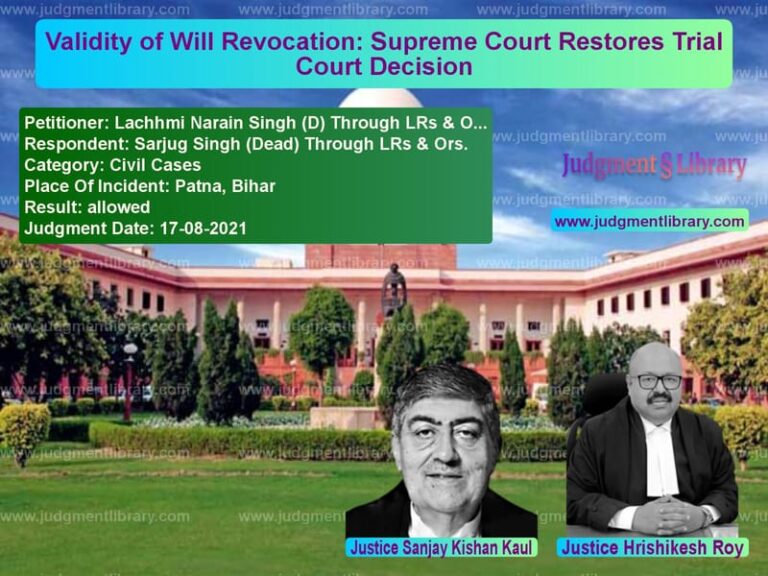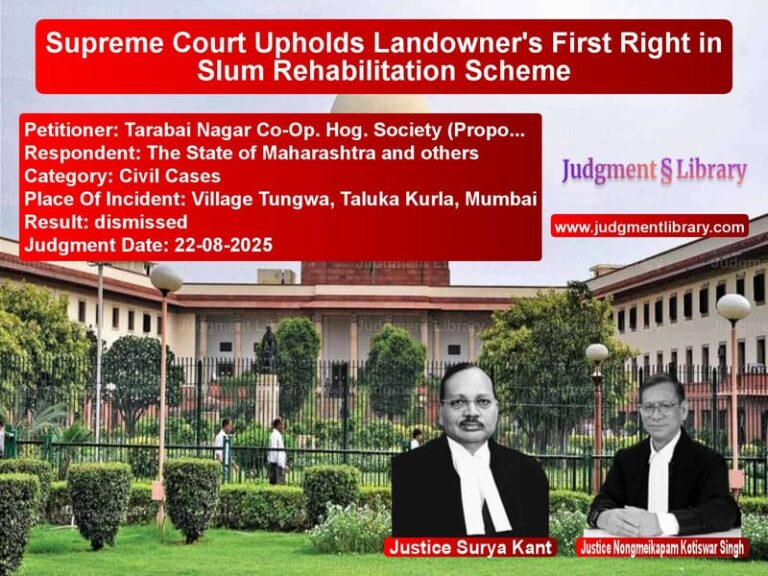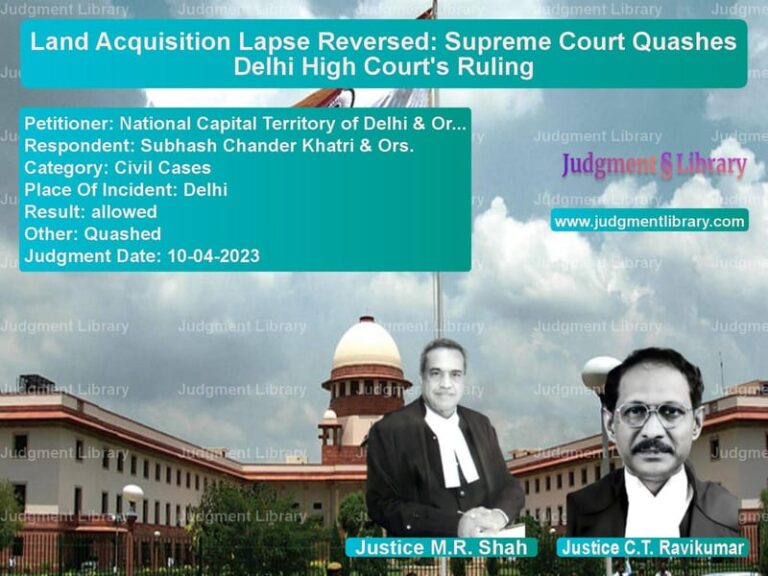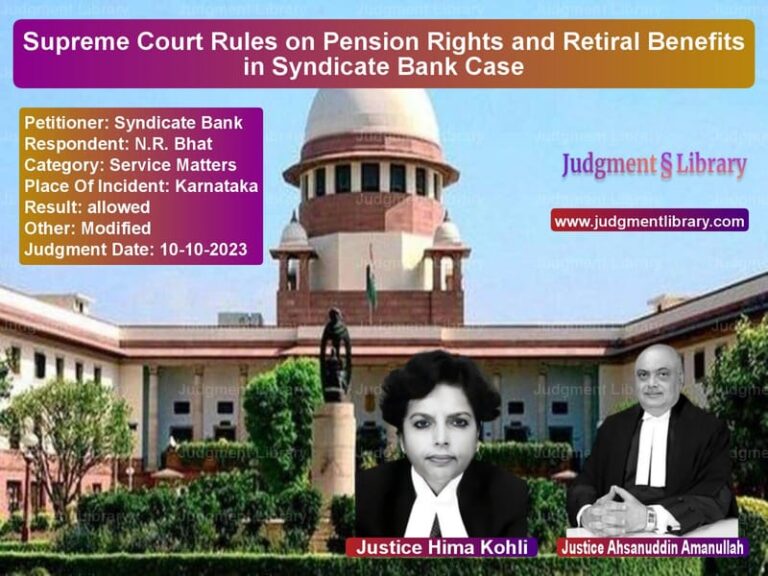Supreme Court Dismisses Appeal in AIIMS Employee Dismissal Case
The case of Prahlad Raut v. All India Institute of Medical Sciences (AIIMS) revolves around the dismissal of an AIIMS employee due to criminal conviction and the delayed legal challenge against his termination. The Supreme Court was tasked with determining whether the dismissal, issued under Rule 19(i) of the Central Civil Services (Classification, Control, and Appeal) Rules, 1965, was legally justified and whether the employee had the right to seek reinstatement after a long delay.
The Supreme Court upheld the decision of the Delhi High Court, dismissing the appeal and ruling that the dismissal was valid and not subject to challenge after a significant delay.
Background of the Case
The dispute originated from a criminal case against Prahlad Raut, who was employed as a Steward at AIIMS. The case involved allegations of financial misconduct and theft, leading to his eventual dismissal. The key developments were:
- In 1991, FIR No. 91 of 1991 was registered against Raut under Sections 406, 420, 468, 471, 477A, and 120B of the IPC for allegedly misappropriating funds and forging signatures of members of an AIIMS cooperative society.
- Raut was arrested and suspended from service on August 7, 1991, as per Rule 10(2) of the CCS (CCA) Rules.
- While under suspension, another FIR No. 868 of 1991 was registered against him for snatching a bag containing ₹290 and lottery tickets from a passerby in Connaught Place, Delhi.
- On September 15, 1993, Raut was convicted under Section 379 IPC and sentenced to probation for one year.
- AIIMS learned about this conviction after nearly seven years and, on January 6, 2000, removed Raut from service with retrospective effect from September 16, 1993, citing his conviction.
Arguments by the Appellant (Prahlad Raut)
Raut challenged his dismissal, arguing:
- The termination order was illegal as it had been issued with retrospective effect.
- The conviction did not automatically warrant dismissal under Rule 19(i) of the CCS (CCA) Rules.
- The dismissal order was issued without proper inquiry or consideration of his probation status.
- Since the first FIR was quashed in 2012 following a settlement, his employment should be reinstated.
- His pension and other retirement benefits were wrongfully withheld.
Arguments by the Respondent (AIIMS)
AIIMS countered Raut’s claims, stating:
- His conviction under Section 379 IPC was for theft, an offense involving moral turpitude, making his further retention in service undesirable.
- As per Rule 19(i), an employee can be dismissed upon conviction in a criminal case without requiring a formal inquiry.
- Raut’s conviction was discovered in 1999, and the dismissal order was issued promptly in January 2000.
- His appeal was rejected in 2000, and he failed to challenge the dismissal within the prescribed limitation period.
- The quashing of the first FIR did not affect his conviction under the second FIR, which was the basis for his dismissal.
Key Observations by the Supreme Court
The Supreme Court reviewed the facts and made the following key observations:
- Dismissal based on criminal conviction is valid: Rule 19(i) allows termination upon conviction, and no further departmental inquiry was required.
- Delay in challenging dismissal: Raut waited for over 13 years before filing an appeal in 2013, far exceeding the limitation period.
- Retirement benefits are forfeited upon dismissal: Since he was removed under Rule 19(i), his claim for pension and provident fund was not maintainable.
- Quashing of one FIR does not affect the other: The first FIR was quashed due to a financial settlement, but his conviction in the second FIR for theft remained valid.
Supreme Court’s Judgment
The Supreme Court dismissed the appeal, stating:
“The appeal, filed after an inordinate delay of 13 years, is barred by limitation. The disciplinary action taken by AIIMS was in accordance with Rule 19(i) of the CCS (CCA) Rules, and the appellant cannot claim reinstatement or pensionary benefits.”
The Court upheld the Delhi High Court’s judgment, affirming Raut’s removal from service.
Implications of the Judgment
This ruling has significant implications for service law and government employment:
- Criminal conviction justifies dismissal: Employees convicted of crimes involving moral turpitude can be removed without a departmental inquiry.
- Delayed legal challenges are not entertained: Employees must challenge dismissal within the prescribed limitation period.
- Retirement benefits may be forfeited: If removal is due to misconduct, pension and gratuity claims are not guaranteed.
- Quashing of one case does not negate another: A settlement in one matter does not impact other criminal convictions.
Conclusion
The Supreme Court’s decision in Prahlad Raut v. AIIMS reinforces the principle that government employees convicted of criminal offenses can be lawfully dismissed under service rules. The ruling emphasizes the importance of timely legal action and upholds the disciplinary framework governing public employment.
This judgment sets a precedent for cases involving government employee dismissals due to criminal convictions and highlights the legal consequences of failing to challenge such orders within the limitation period.
Petitioner Name: Prahlad Raut.Respondent Name: All India Institute of Medical Sciences.Judgment By: Justice R. Banumathi, Justice Indira Banerjee.Place Of Incident: New Delhi.Judgment Date: 27-08-2019.
Don’t miss out on the full details! Download the complete judgment in PDF format below and gain valuable insights instantly!
Download Judgment: Prahlad Raut vs All India Institute Supreme Court of India Judgment Dated 27-08-2019.pdf
Direct Downlaod Judgment: Direct downlaod this Judgment
See all petitions in Termination Cases
See all petitions in Disciplinary Proceedings
See all petitions in Public Sector Employees
See all petitions in Judgment by R. Banumathi
See all petitions in Judgment by Indira Banerjee
See all petitions in dismissed
See all petitions in supreme court of India judgments August 2019
See all petitions in 2019 judgments
See all posts in Service Matters Category
See all allowed petitions in Service Matters Category
See all Dismissed petitions in Service Matters Category
See all partially allowed petitions in Service Matters Category


